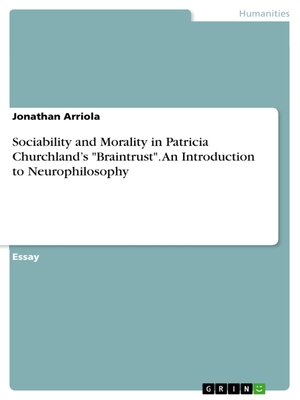Sociability and Morality in Patricia Churchland's "Braintrust". an Introduction to Neurophilosophy
ebook
By Jonathan Arriola

Sign up to save your library
With an OverDrive account, you can save your favorite libraries for at-a-glance information about availability. Find out more about OverDrive accounts.
Find this title in Libby, the library reading app by OverDrive.



Search for a digital library with this title
Title found at these libraries:
| Loading... |
Essay from the year 2014 in the subject Philosophy - Practical (Ethics, Aesthetics, Culture, Nature, Right, ...), grade: 10/10, , language: English, abstract: The aim of this paper is to rebuild the main hypothesis of Churchland's "Braintrust" (2011) postulating that the origins of sociability and morality lie in the neuro-biology of attachment and bonding. The author sides with Hume's conception of morality as grounded in sentiments but Churchland conceives them principally in biological terms by tracing them back to the neurocircuitry of the brain and hormones. Particularly, she puts forward the hypothesis that oxytocin (OXT) is the responsible for the social and moral behavior of mammals, including humans. By the end of this paper, we will address Churchland's criticism of the moral innateness thesis and we will briefly discuss the strong and weak points of her proposal.






